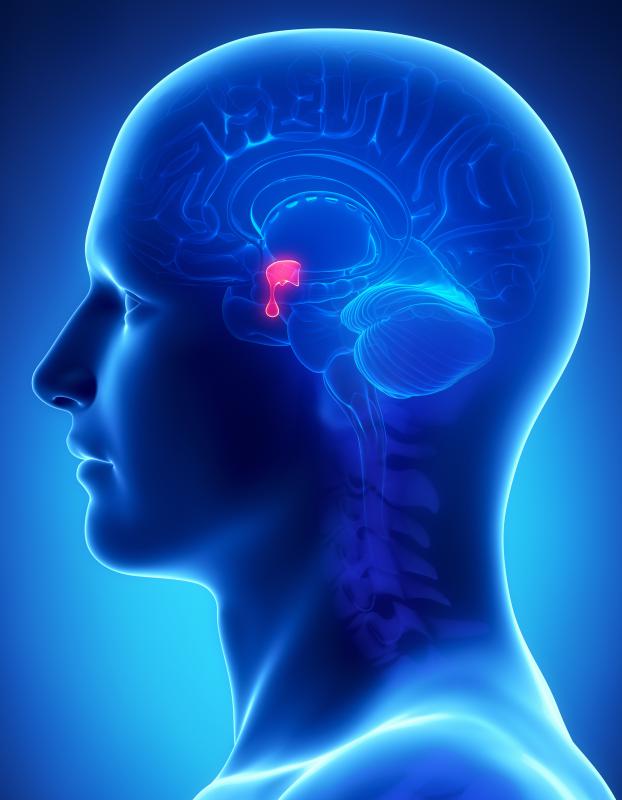At TheHealthBoard, we're committed to delivering accurate, trustworthy information. Our expert-authored content is rigorously fact-checked and sourced from credible authorities. Discover how we uphold the highest standards in providing you with reliable knowledge.
What Happens to Hormones During Menstruation?
Typically, women experience significant changes in levels of hormones during menstruation. At this time, women usually experience a drop in their levels of estrogen, which is the primary sex hormone for females, and progesterone, a hormone that is important in both menstruation and pregnancy. During menstruation, gonadotropin-releasing hormone is produced, which stimulates the release of follicle stimulating hormone. This hormone's release acts on a woman’s ovaries to begin the process of producing an egg that may be fertilized after ovulation.
The hormones estrogen and progesterone are present at varying levels during a woman’s menstrual cycle. They are usually at the lowest levels when a woman is menstruating, however. This is due to the fact that estrogen and progesterone play critical roles in the development of the uterine lining that is shed during menstruation. The drop in levels of these hormones helps facilitate the onset of menstruation.

Another hormone that is active during menstruation is the gonadotropin-releasing hormone. This hormone is produced as a result of stimulation of the hypothalamus gland, which is located in the part of a person’s brain that controls not only her behavior, but also her emotions. This gland also produces and releases various hormones that affect the pituitary gland, which is located at the bottom of the human brain. In particular, the hypothalamus gland secretes gonadotropin-releasing hormone during a menstrual period, which causes the pituitary gland to secrete hormones during menstruation.

The pituitary gland releases follicle stimulating hormones during menstruation. This hormone begins the phase in which a woman’s egg follicles mature. Eventually, this hormone also stimulates the rise in estrogen levels that leads to a surge of luteinizing hormone later in a woman’s cycle. This surge of luteinizing hormone usually occurs several days after menstruation has ended and stimulates the bursting of an egg from a follicle. This event is referred to as ovulation.

Often, the changes in hormones during menstruation mark a period of emotional change as well. As estrogen and progesterone levels fall leading up to menstruation, many women experience premenstrual syndrome, which is marked by mood swings, fatigue, changes in appetite and libido, and bloating. Once a menstrual period begins, however, many women feel better than they did during the premenstrual phase. Often, women feel more at peace during this phase and have fewer emotional fluctuations. This feeling of calm may result from the normalization of levels of estrogen and progesterone.
AS FEATURED ON:
AS FEATURED ON:

















Discussion Comments
I get so depressed during and right before my period that I just shut myself off from the world. I hide in my room and eat salty, sugary snacks and drink caffeine, and though this is comforting to my taste buds, it really makes the rest of my body feel terrible.
We retain water anyway during our menstrual cycle, and eating extra salt only intensifies this effect. I can't seem to help myself, though. It's the only thing that I want to do when I feel this hormonal!
I've heard that taking a walk or any sort of exercise can improve your mood and how you feel during your period, but I just can't bring myself to do this. It's amazing how dark of a place I descend to when my hormones are all out of whack. I lose all sense of what is healthy for me, and I go on a self-destructive binge.
@kylee07drg – I think that has more to do with nerves than with the hormones released during the menstrual cycle. Some people's legs share a pathway of nerves with their uterus.
I've had leg pain during my period before, and I just take painkillers. They work on the cramps, too.
If I'm suffering from mood swings, leg pain, and bloating, I take a menstrual medication. It contains a diuretic and a painkiller, and I feel ten times better after it kicks in.
@Kristee – I think that women's hormones generally make them feel more moody right before menstruation, but I believe that all of us probably suffer more physically during the first two days of menstruation than in the days leading up to it. I know I'm a basket case for about a week before my period starts, but I don't start feeling physically terrible until the flow begins.
My flow is heaviest during the second day. This is also when I feel the most bloated and have the most painful cramps.
Also, my legs feel so heavy. It's weird, but somehow, my period makes my upper thighs feel horrible! Does anyone know what this is about?
I think that my hormones released during menstruation must be slightly off the regular pattern that most women follow, because I don't feel better after my period starts. In fact, I feel worse.
I get so bloated, and I have cramps so severe that I sometimes have to miss work. This puts me in a terrible mood, because I feel like a slave to my period. I can't get anything done feeling this way.
Post your comments